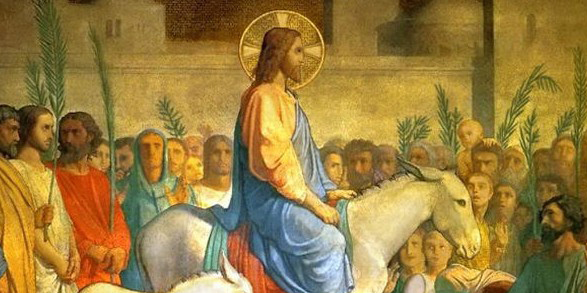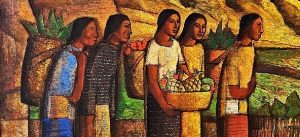“We turn to God for help when our foundations are shaking, only to learn that it is God who is shaking them.” – Charles West, Princeton Theological Seminary
Last year, I had the privilege of preaching to you on Palm Sunday. I don’t expect you to remember the sermon – so breathe easy, there won’t be a quiz. Last year we looked at the Gospel of Luke; today, it is the Gospel of Matthew. Most of the story is the same in each rendition – the palms, the entry, the people shouting Hosannas. Let’s look at what’s the same.
In both texts, Jesus enters Jerusalem through the back gate. Let me recap from last year, because what we learned then applies to today’s message as well. Preparations for the Jewish high, holy holiday of Passover began on that particular Sunday, our Palm Sunday, two thousand years ago. Over two hundred thousand pilgrims packed Jerusalem for Passover – more than twice the normal population. Most visitors were there to offer their yearly sacrifice at Herod’s temple, which was the center of Passover activity.
Because of overcrowding, not everyone stayed in the city – including Jesus. Both stories tell us that Jesus stays in Bethphage and in Bethany, east of the city. To the west of Jerusalem lay Herod’s palace and city by the sea, Caesarea Maritima, a luxury resort where Jerusalem’s governor, Pontius Pilate, and the other Roman leaders lived. It was proper protocol for the Roman governor to be in Jerusalem during the Passover, out of respect for the Jewish religious traditions, and out of extreme caution. Jerusalem had seen a number of revolts in the years prior, and Passover was a reminder to the Jews that they were still under the oppression – this time by the Romans, the new Egypt. Pilate leaves his opulent home in Caesarea Maritima and enters Jerusalem to discourage any thought of rebellion.
The Roman entourage comes from the west through the Western Gate – that is the front gate of Jerusalem. They march into the city with a calvary, chariots, foot soldiers, leather armor, metal helmets, and spears. Pilate brings up the rear with golden eagles mounted on poles and Roman banners waving around him. He shows off the empire’s power to a turbulent Jerusalem. But more than that he shows off Roman theology. Roman emperors were considered deities, born from the god Apollo. They carried divine titles such as “son of God,” “lord” and “savior,” and one who had brought “peace on earth.” Pilate’s procession reflected what peace and salvation looked like to Rome.
Because Jesus stayed in Bethphage, and because the West Gate was occupied, Jesus enters through the East Gate – the back gate. This is no accident. Jesus secures ahead of time a donkey and her colt. He sends his disciples to make the path ready and gather his followers for the moment he enters the city to set up the Triumphal Entry. The crowd that gathers knows Jesus. They shout and waves the palms, calling attention to his arrival. In our story, they are the ones who spread the word about Jesus’ to those who don’t know him. They staged a planned political protest during Passover in direct opposition to Pilate’s procession on the opposite end of the city. Unlike Pilate, Jesus enters Jerusalem, alone, on a donkey, with palm branches lining the path. His followers cry “hosanna,” which means “God save us!” In staging this protest, Jesus presents an alternate view of what peace and salvation look like.
That is where the Triumphal Entry in Luke and Matthew are the same. But Matthew’s gospel has two important differences that I’d like to point out. After all, last year’s sermon was meant for last year. And this year? Well, let’s just say a lot more than the liturgical calendar has changed since last year.
The first difference is the donkey. In Luke, Jesus sends for one animal, a donkey, for him to ride into the city. In Matthew, he sends for two. This is to fulfill the prophecy of Zechariah quoted in our scripture today. The prophecy says:
Lo, your king comes to you;
triumphant and victorious is he,
humble and riding on a donkey,
on a colt, the foal of a donkey.
It’s possible that because Matthew was most likely Jewish and writing for a Jewish Christian community, he was overly concerned with getting the prophecy of Zechariah exactly right. So Matthew tells us Jesus rides both a donkey and a colt. However, it’s a stretch to believe that Matthew would depict Jesus riding both a donkey and her colt like a trick rider in a rodeo. It’s more likely that Jesus rode the mother donkey and allowed the colt to tag along so they are not separated. This is in contrast to the scores of stallions riding in the Roman procession. It’s such a small detail – Jesus showed enough concern for a nursing donkey, he allowed her colt to travel by her side. No one get left out of Jesus’ kingdom, not even a baby donkey.
The second difference is in verse ten: “When he entered Jerusalem, the whole city was in turmoil, asking, ‘Who is this?’” The word for turmoil there is “εσειθη.” It is a passive form of the Greek verb “σειω,” meaning to shake or quake. “Σειω” is where we get our English word for seismic, as in seismic activity or earthquakes. So it would be better to interpret verse ten as, “When he entered Jerusalem, the whole city was shaken to the core, asking, ‘Who is this?’”
“We turn to God for help when our foundations are shaking, only to learn that it is God who is shaking them.”
These past six months have shaken me to the core. The foundations of all that we’ve known, all that we’ve trusted, and all that we’ve believed in have crumbled before our eyes. Our nation has undergone a tectonic shift in the way it represents truth, hospitality, and responsibility. Each morning I wake up to another new revelation, another tiny earthquake, another change in our landscape by people who do not represent my values or my beliefs.
You know what hasn’t changed since that Palm Sunday, two thousand years ago? The true essence of power.
Rome couldn’t rule Jerusalem without the help of the Jews. Rome placed wealthy Jewish families in power to keep the order and to collect the yearly Roman tribute. Rome trusted wealth. The wealthy trusted power. The rich became not just the secular rulers of Jerusalem, but also the chief priests, elders, and scribes. They ran the Temple, the center of the Jewish faith. With their new power, the new ruling class grew their coffers by exploiting the poor, who often had to mortgage their family property in order to pay debts due to high taxes – the same taxes that built Herod’s Temple and the palaces at Caesarea Maritima. Even the chief priests owned property, which was against the law of Moses. But it was easy enough for wealthy scribes to reinterpret the law in order to allow them to confiscate land. Concentrated wealth, exploitation of the impoverished, political oppression, and then religious justification for it all, kept the powerful in power and the poor under their feet.
How do you break apart an unbreakable system? You bring it down with an earthquake.
The Constitution of the United States was created to form a more perfect union, to establish justice, to ensure domestic tranquility, to provide for a common defense, to promote general welfare, and to secure liberty for us and for those who follow after us. And yet, at no other time in history, except the Civil War, have we been so fractured, so polarized, so filled with anxiety, so afraid, and so untrusting, than we are right now. We’ve called the truth a lie so often, we can’t tell the difference any more, even when we see it with our own eyes. Wall Street concentrates wealth for a few by exploiting the middle class until we have no more middle class. Men, women, and children are threatened in their homes, some beaten in the streets, because of their religion or the color of their skin. Protections for people of color, LGBTQ communities, women, and immigrants are vanishing. Where is the church in all of this?
I hate to say it, but some of our brothers and sisters in Christ are waving flags at the West Gate. They sold their soul to the empire. They justify trampling the poor and the marginalized, for a place at Caesar’s table. They support policies committed to selfishness, exclusion, and greed; forgetting that the foundation of God’s law is selflessness, inclusion, and humility. They defend their actions by quoting scripture, but forget that we are called to love our neighbor as ourselves. No exceptions.
“We turn to God for help when our foundations are shaking, only to learn that it is God who is shaking them.”
The good news is that if the earthquake has come, then Jesus is here. We aren’t alone and we are many. I was reminded this week that we can lead with both our heart and our spine. The courage that propels Jesus through the east gate and on to Calvary is available to us any time. It requires of us a different set of rules, because we are fighting for not a kingdom of this earth, but for the Kingdom of God. We fight for justice, equity, parity. We fight for a Kingdom of God that is here and now, available to everyone – not just a chosen few.
If you have ears to hear, if you have eyes to see: this is the true essence of power. It doesn’t sit in a gilded palace by the sea, nor does it come with golden eagles and a military escort. True power gets its strength from the community who supports it. True power comes through the back gate. True power brings peace without swords or spears or bombs. True power comes riding a nursing donkey with her baby trotting beside her, because daycare wasn’t available for her that day. True power knows the risks, gives his life, and trusts in the resurrection.
Hosanna – save us – Son of David! Hosanna in the highest!
And may God have mercy.



[…] Shaken to the Core […]